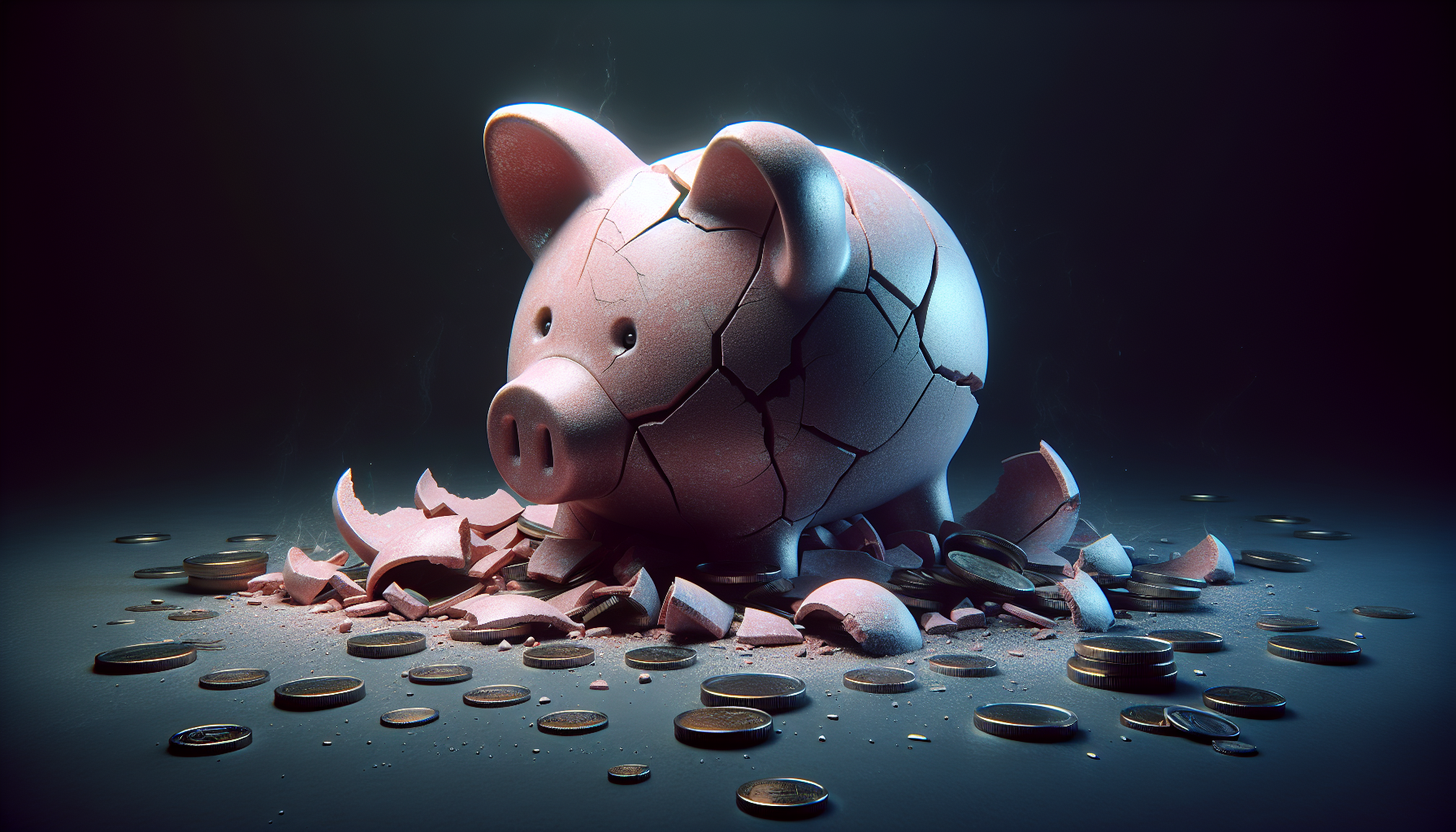
Bankruptcy can indeed have a significant impact on credit scores, which in turn affects an individual’s financial health. It is important to understand how bankruptcy affects credit scores and the different types of bankruptcy and their specific impacts.
The negative consequences of bankruptcy on credit scores are evident, with insolvency effects on FICO scores and debt discharge consequences.
This credit rating aftermath can be daunting, but there is hope for financial rehabilitation.
Understanding the insolvency effects on FICO scores is crucial when considering bankruptcy. Filing for bankruptcy can lead to a significant drop in credit scores.
The severity of the impact depends on various factors, including the individual’s credit history, the amount of debt discharged, and the type of bankruptcy filed. These debt discharge consequences can make it challenging to secure loans or rebuild one’s financial standing.
‘Click here to learn more about: ‘ file7file13.com
Insolvency Effects on FICO: Understanding the Basics
Insolvency is indeed a significant factor that can have a substantial impact on an individual’s FICO score. Understanding the basics of this relationship is crucial for maintaining good creditworthiness.
Insolvency, defined as the inability to meet financial obligations, can occur due to various reasons such as an economic downturn, job loss, or excessive debt.
When a debtor goes through bankruptcy, their credit score takes a major hit.
The negative effects of bankruptcy can remain on credit reports for a significant period of time, depending on the type of bankruptcy filed. But there are strategies to repair credit after bankruptcy, such as establishing new credit and making timely payments.
Credit counseling and debt management programs can also help in the post-bankruptcy recovery process. Rebuilding credit post-bankruptcy involves responsible management of new credit and avoiding past financial mistakes. It’s important to note that the time it takes to rebuild credit after bankruptcy can vary depending on factors such as Creditworthiness Decline Post-Bankruptcy, Debtor Credit Reassessment Techniques, Score Improvement Post-Debt Resolution, Fiscal Recovery Ratings Exploration, Credit History Reset Strategies, and Score Repercussions After Debt Relief.

How Does Debt Discharge Consequences Affect Your Future?
Debt discharge consequences can have a significant impact on your future financial health. When your debts are discharged, it provides immediate relief from overwhelming financial burdens and eliminates your legal obligations to repay those debts.
This means you no longer have to worry about the constant pressure of debt hanging over your head.
It’s important to understand the long-term effects on your credit score.
Bankruptcy, for example, can have a negative impact on your credit score and creditworthiness. Your credit profile may be affected for a significant period of time, making it more difficult to obtain loans or credit in the future.
To rebuild your credit after bankruptcy, credit repair becomes crucial. This involves taking steps to repair your credit and establish a positive credit history.
Financial insolvency rating impact is an important consideration in this process.
It is important to be proactive in reconstructing your credit profile after bankruptcy
Debt Discharge Consequences
- Debt discharge provides immediate relief from overwhelming financial burdens.
- Debt discharge eliminates your legal obligations to repay those debts.
- Bankruptcy can have a negative impact on your credit score and creditworthiness.
- Rebuilding credit after bankruptcy requires proactive credit repair and establishing a positive credit history.
Navigating Credit Rating Aftermath: Steps to Recovery
Credit rating recovery is crucial after bankruptcy as it determines an individual’s financial future. By understanding the steps to recovery, individuals can rebuild their credit and regain financial stability.
The Impact of Bankruptcy on Credit Scores:
Bankruptcy significantly affects credit scores, with Chapter 7 and Chapter 13 bankruptcies having different implications.
Liquidation proceedings and rating adjustments, including Chapter Credit Adaptation, are common during bankruptcy, leading to lower credit scores.
Understanding the Score Dynamics Following Financial Reset is essential for individuals to navigate their credit rating aftermath.
Understanding Credit Repair After Bankruptcy:
Credit repair involves reviewing credit reports for errors and inaccuracies.
It is crucial to identify and dispute incorrect information, including Score Implications from the Means Test, to improve credit ratings. Debtor education and scoring factors, such as those related to Chapter Credit Adaptation, Liquidation Proceedings, and Rating Adjustments, play a vital role in the dynamics of scores following a financial reset, recovery after credit discharge, and the implications of means test scores.
Financial Rehabilitation Metrics: Gauging Your Progress
Financial rehabilitation after bankruptcy requires a thorough evaluation of key metrics to gauge your progress and improve your financial health. One such metric is your credit history, which includes understanding the impact of bankruptcy on your credit score and exploring ways to repair it.
Tracking your debt-to-income ratio is vital, as it defines your financial stability and should be monitored over time.
Managing your credit utilization effectively is another important consideration as it affects your credit score.
By implementing credit utilization improvement tactics, you can optimize this metric and positively impact your overall financial rehabilitation. It is crucial to understand the scoring for a financial fresh start and how the Automatic Stay and its credit effects play a role in rebuilding your credit.
Analyzing your payment history and maintaining a positive record is crucial for long-term financial recovery. Petitioning effects on credit can be mitigated by consistently making on-time payments and managing any secured or unsecured credit rating adjustments.
Financial Rehabilitation After Bankruptcy
- Understanding the impact of bankruptcy on your credit score is crucial for financial rehabilitation.
- Tracking your debt-to-income ratio is vital as it defines your financial stability and should be monitored over time.
- Managing your credit utilization effectively can positively impact your credit score and overall financial rehabilitation.
- Maintaining a positive payment history by consistently making on-time payments is crucial for long-term financial recovery.
Analyzing Default History: Lessons for Credit Improvement
Is a critical aspect of rebuilding credit after bankruptcy. Understanding the impact of bankruptcy on credit scores is crucial to developing effective strategies for credit improvement.
Various types of bankruptcy have different effects on credit scores.
To start rebuilding credit, it is important to create a budget and engage in financial planning.
This will help individuals manage their finances effectively and make on-time payments. Utilizing secured credit cards can also be beneficial, as they provide an opportunity to establish positive credit history.
In the long run, bankruptcy can significantly impact credit ratings. There are steps individuals can take to improve their credit rating over time.
Regular credit monitoring and checking credit reports play a crucial role in monitoring credit improvement progress.
Score Evolution After Debt Resolution is a key aspect to consider in credit improvement.
Understanding how credit scores evolve after resolving debt can help individuals track their progress
Key Solvency Rebound: Factors for a Healthier Credit Score
A healthy credit score is crucial for individuals seeking loans or engaging in financial transactions. Understanding the impact of bankruptcy on credit scores is vital for developing strategies to repair credit.
After bankruptcy, credit scores typically drop initially, but the magnitude depends on various factors.
To rebuild credit after bankruptcy, responsible financial behavior is the key.
This includes establishing a budget, using a secured credit card wisely, and gradually diversifying the credit portfolio. Patience and persistence are necessary for credit score recovery, along with timely bill payments and avoiding new financial troubles.
It’s important to note that bankruptcy has long-term consequences on credit rating and creditworthiness. By focusing on key solvency rebound factors, individuals can work towards a healthier credit score.
Evaluation of solvency scores and case shifts in credit scoring play a significant role in understanding creditworthiness. Post-filing credit damage mitigation is crucial for individuals seeking to improve their financial standing after experiencing insolvency, as it plays a significant role in evaluating solvency scores, credit mix enhancement, and addressing the potential negative impact of ledger entries on overall credit scoring.
| Credit Score Recovery Factors | Post-Filing Credit Damage Mitigation | Creditworthiness Evaluation |
|---|---|---|
| Establishing a budget | Evaluating solvency scores | Credit mix enhancement |
| Using a secured credit card wisely | Addressing potential negative impact of ledger entries | Case shifts in credit scoring |
| Gradually diversifying the credit portfolio | ||
| Timely bill payments and avoiding new financial troubles |
Tackling Creditworthiness Decline Strategies for Rebound
Bankruptcy has significant effects on creditworthiness, resulting in a decline in credit scores and impacting one’s ability to obtain loans or credit cards. The credit score implications of bankruptcy are severe, and the bankruptcy record stays on the credit report for several years, highlighting the long-term effects on creditworthiness.
Developing a Strategic Credit Repair Plan
Following the recovery period following credit score decline caused by bankruptcy, it is crucial to develop a structured plan to repair credit effectively.
Trustees play a significant role in rebuilding credit scores, and their influence is vital during this process.
Implementing limitation techniques for credit damage can also aid in accelerating the credit repair journey. Debt wipeout and scoring reactions can have significant impacts on individuals’ creditworthiness, recovery period following a credit score decline, trustees’ influence on rebuilding scores, limitation techniques for credit damage, announcement effects on creditworthiness, and notification and scoring adjustments.
Debtor Credit Reassessment: Techniques Starting Afresh
After bankruptcy, debtors need to reassess their credit and develop strategies for repair and rebuilding. Bankruptcy has a significant impact on credit scores, making credit repair essential for a fresh start.
Understanding the relationship between bankruptcy and credit scores is crucial, as different credit scoring models may be affected differently.
It’s necessary to address the duration of credit score impact post-bankruptcy and implement techniques for a successful recovery.
Credit repair involves several steps, including obtaining a copy of your credit report and identifying and disputing any inaccuracies. It is important to enroll in a Financial Management Course and Credit Improvement program to enhance your understanding of credit conditions and learn effective judgment-proofing strategies.
This counseling can significantly impact your financial health and help you develop tailored tactics for credit rebuilding.
Making consistent and timely payments is crucial for improving credit. Scoring for financial solvency requires a diligent approach towards Financial Management Course and Credit Improvement, Judgment Proofing and Credit Conditions, Counseling Impact on Financial Health, Scoring for Financial Solvency, Setback Duration in Credit Recovery, Adjustment Tactics for Credit Rebuilding.
| Factors | Impact on Credit Scores | Recovery Techniques |
|---|---|---|
| Bankruptcy | Significant negative impact | Enroll in Financial Management Course and Credit Improvement program |
| Credit Repair | Essential for a fresh start | Obtain credit report, identify and dispute inaccuracies |
| Diligent Payments | Crucial for improving credit | Consistent and timely payments |
| Counseling Impact | Significantly impacts financial health | Enhance understanding of credit conditions and develop tailored tactics for credit rebuilding |
Credit Counseling PostBankruptcy A Fresh Start
PostBankruptcy Credit Rebuild

Get a Free Bankruptcy Case Evaluation